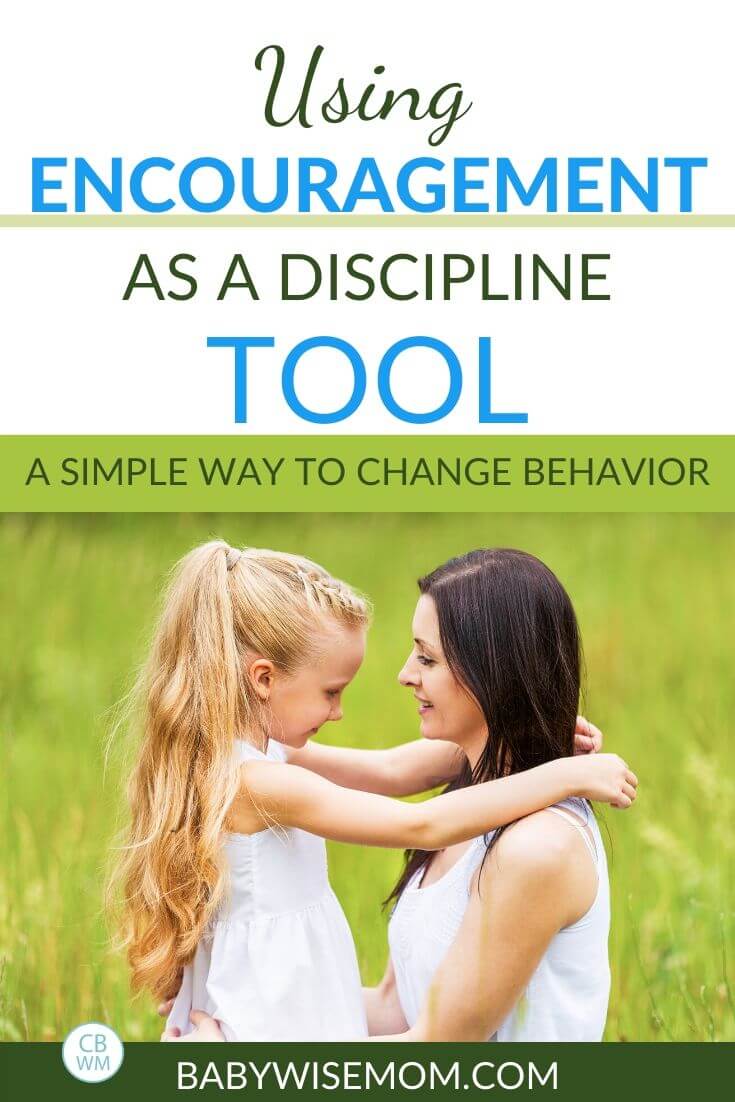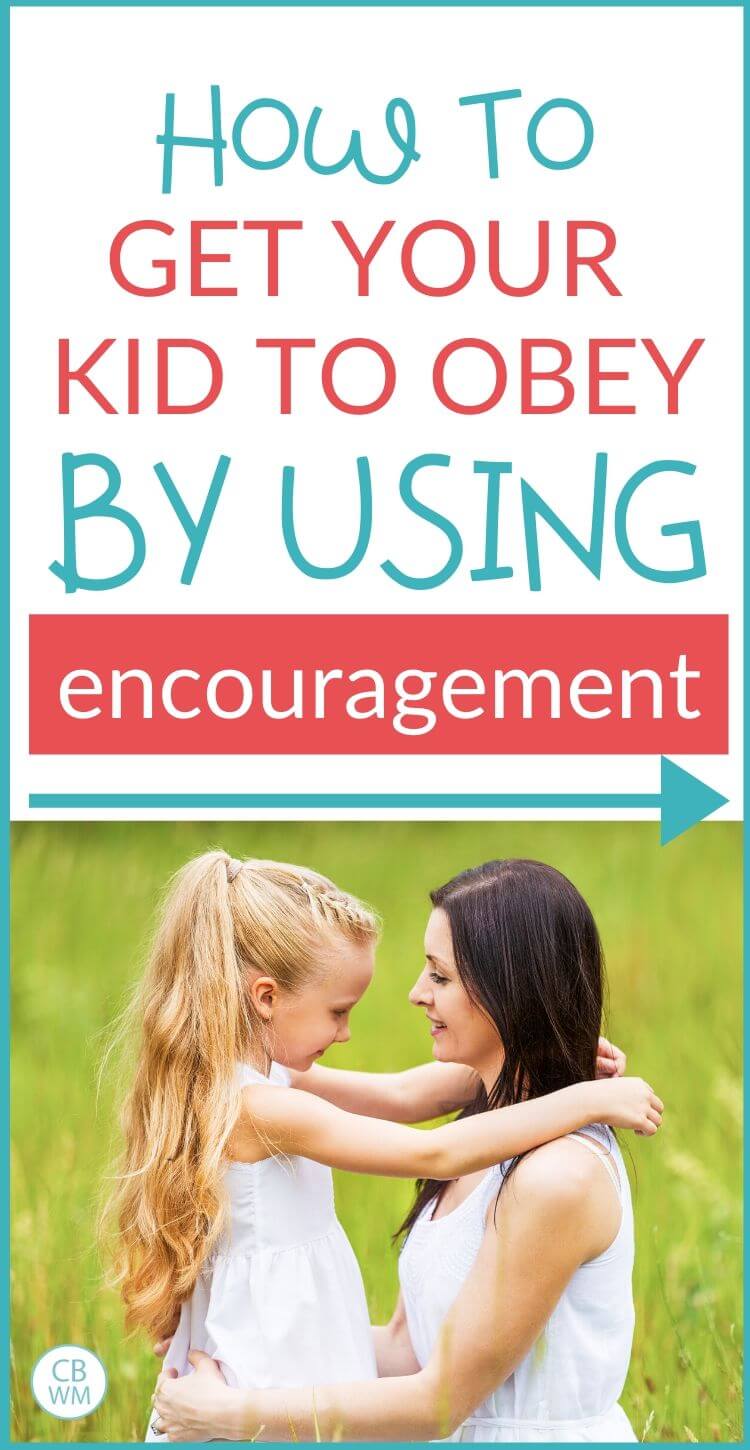There are many ways to discipline, or correct, a child, and encouragement is one of those! Read all about how to use encouragement as discipline in this post.

Did you know that encouraging your child can actually be a form of discipline?
Huh? Encouragement as discipline? But encouragement is positive, and discipline is negative, right?
Nope!
Discipline is teaching and guiding. It doesn’t mean being angry, upset, or even disappointed. It means you are guiding your children in the direction they should go.
Discipline is often thought of as something mean or strict, but there are so many positive discipline methods you can use. You can “discipline” simply through your example. Children learn so much from simply watching parents.
Using your example is a great form of prevention. It can prevent you from having to correct a child. Another great form of prevention is ask and tell. This is when you review expectations before approaching an activity. Read all about Ask and Tell here.
Read: Why Prevention is a Powerful Parenting Tool
Encouragement is another tool of prevention. Using encouragement is all about preventing. Step in and prevent the meltdown. It is encouraging your child to make a wise choice that won’t lead to a loss of privilege or another form of punishment.
On Becoming Pre-Toddlerwise states,
“…there is also the encouragement side of training which is always positive, affirming and serves to motivate”.
(page 117)
It also points out that:
“…certain behaviors will always be followed by disappointing consequences, and other behaviors will be followed by praise and encouragement”.
(Toddlerwise, page 96)
Perhaps some of you are like me. When your child first starts doing what you tell him to, you offer praise and encouragement.
As he continues to be good and obedient, however, you start to become lax in the encouragement department. You start to take this obedience and good behavior for granted. As you do this, you continue to offer the consequences and punishments for poor behavior.
Is that a problem? I absolutely think it is a problem.
People operate best with positive reinforcement. When you take the encouragement from your child and maintain the punishments, there are not positive words to keep him going.
He can become frustrated and feel like he can never be good enough no matter how hard he tries.
Think of yourself. Chances are you can think of plenty of things you do that seem un- or under- appreciated. Those thank yous and kind words from friends, family, co-workers, strangers, etc. keep you going.
Some of you are better at giving compliments and encouragement than others. I am one who is not as good at giving compliments and encouragement. I think them, but I don’t verbalize them like I should.
Every so often when Brayden was a toddler, he would say to me, “That is a good boy to XYZ, huh.”
That always made me chuckle. He reminded me when he is in need of encouragement.
We must be conscious of encouragement. We must let our children know when they have made a right decision.
We must let them know that we notice and appreciate how hard they are working. Be complimentary of them. This will give them the fuel to keep working at improving themselves.
Let’s talk about some “how” below.
Read: Training in Times of Non-Conflict
Post Contents
How to Use Encouragement as Preventative Discipline
What are some ways we can be encouraging?
Thank for Obedience
Thank your children for being obedient. Point out what was done well.
Tell your child she did a great job at coming to you when you called her. Offer encouraging words when your child decides to be obedient.
Do this even when you have had to remind her several times and when she is doing it begrudgingly. When my children are obeying in this manner, I often thank them with a twinkle in my eye and I exaggerate the thanks. This often makes them giggle and snap out of the bad mood and into a good one.
Catch Good Deeds
Your child will often do kind things or the right things without you having to instruct her to do so. Recognize these moments.
Offer her encouraging words, give her hugs, thank her, and/or talk about how that makes her feel inside. Help your child to recognize that choosing correct behavior leads to her feeling happy inside. Help her recognize the good that comes from obeying.
Read: 8 Ways to Use Positive Reinforcement for Good Behavior
Recognize the Effort
Whether your child tried to control her temper but failed, or worked really hard to sweep the floor (and did a great job or a job you might expect from three year old capabilities), recognize the effort that was put into it.
“I could tell that you really tried to not yell. That was good work.” Then you can talk about ways she can be more successful next time.
“Thank you for all of your work in sweeping the floor. You worked really hard.” And don’t go on behind her and pick up all that she missed.

Results of Using Encouragement
When you are encouraging and focus on the positive, your children will want to be even better. They will work harder and put more effort into doing the right thing.
That is why I will often thank for obedience even when it is not with the best attitude. They are children after all–adults get grumpy and stomp around–why would a child be any different?
A way a child is different than an adult is in the ability to snap out of a bad mood quickly, and focusing on the positive helps them do that.
Once the attitude is improved, you can sometimes point out, “Isn’t it much nicer to be in a happy mood than a grumpy mood?” Most of the time, however, let experience do the teaching. Stay positive and encouraging.
Conclusion
Using encouragement as a form of preventative discipline can help it so you don’t have to use further methods of discipline in the future. Focusing on encouragement in the moment is less work than needing to discipline further down the road.
 On Becoming Pretoddlerwise:...Shop on Amazon
On Becoming Pretoddlerwise:...Shop on Amazon
Related Discipline Posts
- Think Prevention First
- A Simple One-Liner to Keep Kids on Track
- How To Get Your Child to Obey with a Simple “Yes Mom”
Reader Comments
Atara said: I was listening to a momsnotes presentation just this afternoon on children’s love languages and one of them was encouraging words. You are right. It is so easy to be a “nag” to our kids, if you will. Praise and showing love to our children in the way the meets their needs best can curb so many problems.
Maureen said: I love the love languages idea. I read the book. William doesn’t ask me to provide encouragement. He asks me to play with him. He plays well on his own, but quality time is definitely his love language. Thanks for the reminder!
Susanne said: I agree about children needing more praise. I use to teach before I became a mom three months ago. One of the most motivating ways to get a child to do something or continue doing positive things is to offer continuous praise. Child seek attention and they don’t discriminate between negative or positive attention. I found that with the children that were often getting yelled at or in trouble were the children who where usually seeking attention. Unfortunately the attention they were after was negative. The teachers’ response to their negative behavior only helped to reinforce the poor behavior because the child was getting the attention he or she craved. I decided to not give as much attention to the negative behavior and focus on their positive behavior, which really helped to change a lot of the negative behavior that I was seeing in the children. Just thought I was share my personal experience with praise!

This post is a combination of posts that originally appeared on this blog in December 2008 and October of 2012

